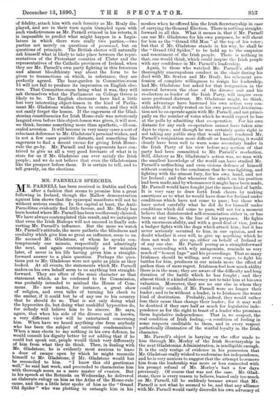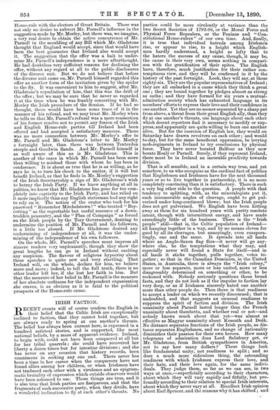MR. PARNELL'S SPEECHES.
MR. PARNELL has been received in Dublin and Cork after a fashion that seems to promise him a great following in Ireland, though the Mallow demonstration against him shows that the episcopal manifesto will not be without serious results. In the capital at least, the Anti- Parnellites evidently find little favour, and Mr. Healy has been hooted where Mr. Parnell has been vociferously cheered. We have always contemplated this result, and we anticipate that even the Irish Bishops will not succeed in finally sub- verting Mr. Parnell's influence. But the more we watch Mr. Parnell's attitude, the more pathetic the blindness and credulity which give him so great an influence, seem to us. He accused Mr. Gladstone, of whom he speaks con- temptuously one minute, respectfully and admiringly the next, and again contemptuously a few minutes later, of never in his life having given him a straight- forward answer to a plain question. Perhaps the ques- tions put to Mr. Gladstone were not quite as plain as they looked. At all events, the statements which Mr. Parnell makes on his own behalf seem to us anything but straight- forward. They are often of the same character as that statement which, as he confessed to the Commission, was probably intended to mislead the House of Com- mons. He now makes, for instance, a great show of religion, and even talks of turning his cheek to the smiter, if it could but be of any use to his country that he should do so. That is not only doing what the hypocrites do, but doing what unskilful hypocrites do, for nobody will believe him to be sincere. He says, again, that when his side of the divorce suit is known, a very different view will be entertained concerning him. When have we heard anything else from anybody who has been the subject of universal condemnation ? When a man elects to say nothing in his own defence, he would consult his dignity better by not adding that if he could but speak out, people would think very differently of him from what they do think. Then, in dealing with Mr. Gladstone, he is evidently most anxious to leave a door of escape open by which he might reconcile himself to Mr. Gladstone, if Mr. Gladstone would but be reconciled to him. " I know this old gentleman well," he said last week, and proceeded to characterise him with thorough scorn as a mere master of evasion. But in his speech at the Rotunda on Wednesday, he delivered an elaborate eulogy on him as the Atlas of the Home-rule cause, and then a little later spoke of him as the " Grand Old Spider " who was plotting to entangle him in his meshes when he offered him the Irish Secretaryship in case- of carrying the General Election. There is nothing straight- forward in all this. What it means is, that if Mr. Parnell' can use Mr. Gladstone for his own purposes, he will shout for him as the "Grand Old. Man" at the top of his voice ; but that if Mr. Gladstone stands in his way, he shall be the " Grand Old Spider," to be held up to the suspicion and resentment of the Irish people. There is nothing in that, one would think, which could inspire the Irish people with any confidence in Mr. Parnell's leadership. Again, to those who watched Mr. Parnell's able and' thoroughly unscrupulous conduct in the chair during his duel with Mr. Sexton and Mr. Healy, his vehement pro- fession of complete willingness to resign his leadership, had Mr. Gladstone but asked for that resignation in the interval between the close of the divorce suit and his re-election as leader of the Irish Party, will inspire even more profound distrust. Mr. Gladstone might, we think,. with advantage have hastened his own action very con- siderably, if it really rested on his own personal determina- tion not toco-operate again with Mr. Parnell, and not princi- pally on the number of votes which he would expect to lose at the polls by admitting that co-operation. For his own distaste for any such co-operation cannot have taken nine days to ripen ; and though he was certainly quite right in not taking any public step that would have rendered. Mr. Parnell's resignation more difficult or humiliating, it would clearly have been well to warn some secondary leader in the Irish Party of his view before any section of that party had been committed to Mr. Parnell's re-election. Still, dilatory as Mr. Gladstone's action was, no man with the smallest knowledge of the world can have studied Mr. Parnell's unflinching and even vicious defence of himself without coming to the conclusion that he was fighting, and- fighting with the utmost fury, for his own hand, and not for Ireland ; and that whenever the attack on his position had been made, and by whomsoever it might have been made, Mr. Parnell would have fought just the same kind of battle. It is very easy to draw forth Irish cheers by making assertions as to what he would have done for Ireland under- conditions which have not come to pass ; but those who- have noted carefully what he did do for himself under conditions which did come to pass, will not for a moment believe that disinterested self-renunciation either is, or has been at any time, in the line of his purposes. He fights with enormous ability, and with a good deal of vice, just as a badger fights with the dogs which attack him ; but it has never seriously occurred to him, in our opinion, and we doubt whether it ever will, to give up anything which he does not wish to give up, either on behalf of Ireland or of any one else. Mr. Parnell posing as a straightforward man, contending with wily antagonists, reminds us very much of " honest Iago " and his proceedings. That so many. Irishmen should be willing, and even eager, to fight his battles for him, produces in our minds more the effect of pathos than of mere regret. Irishmen feel how much ability there is in the man; they are aware of the difficulty and long- duration of the battle which he has fought ; and they almost think it a kindof indecency not to take him at his own valuation. Moreover, they see no one else in whom they could really confide, if Mr. Parnell were no longer their leader ; and to be without a leader, is to Irishmen the worst kind of destitution. Probably, indeed, they would rather lose their cause than change their leader; for it may well be doubted if they care half as much for legislative inde pendence as for the right to boast of a leader who promises- them legislative independence. That is, we suspect, the real condition of Irish feeling,—a condition of feeling in some respects creditable to them, and in every respect pathetically illustrative of the wistful loyalty in the Irish character.
Mr. Parnell's object in harping on the offer made to- him through Mr. Morley of the Irish Secretaryship in the next Gladstonian Administration, is intelligible enough. It is the only vestige of evidence in his possession that Mr. Gladstone really wished to undermine his independence, and he is very anxious to suggest that the attempt to remove- him from the leadership was more or less connected with his prompt refusal of Mr. Morley's bait a few days previously. Of course that was not the case. Mr. Glad- stone, there is every reason to believe, leaned only too much, on Mr. Parnell, till he suddenly became aware that Mr. Parnell is not what he seemed to be, and that any alliance with Mr. Parnell would vastly discredit his own advocacy of Home-rule with the electors of Great Britain. There was not only no desire to subvert Mr. Parnell's influence in the suggestion made by Mr. Morley, but there was, we imagine, a very real desire to obtain the active concurrence of Mr. Parnell in the moulding of any Bill which Mr. Gladstone thought that England would accept, since that would have been the best guarantee that Ireland also would accept it. The suggestion that the offer was a bait to under- mine Mr. Parnell's independence is a mere afterthought. He had doubtless very sufficient reasons for declining the offer, without any regard at all to the public disclosures of the divorce suit. But we do not believe that before the divorce suit came on, Mr. Parnell himself regarded this offer as another form of the invitation given by the spider to the fly. It was convenient to him to suggest, after Mr. Gladstone's repudiation of him, that this was the drift of the offer; but we may be sure that he never so regarded it at the time when he was frankly concerting with Mr. Morley the Irish procedure of the Session. If he had so thought, there would have been some trace of it in the manner of his refusal, and we may trust Mr. Morley when he tells us that Mr. Parnell's refusal was a mere reassertion of his former resolve not to permit any fusion of the Irish and English Home-rule parties till Ireland had been offered and had accepted a satisfactory measure. There was no more connection between Mr. Morley's offer to Mr. Parnell and Mr. Gladstone's letter to Mr. Morley a fortnight later, than there was between Tenterden steeple and Goodwin Sands. And Mr. Parnell himself is as well aware of this as is Mr. Gladstone. This is another of the cases in which Mr. Parnell has been more than willing to mislead those with whom he has been in conference. It is about as true that he is as willing, as he says he is, to turn his cheek to the smiter, if it will but benefit Ireland, as that he finds in Mr. Morley's suggestion of the Irish Secretaryship a sign of Mr. Gladstone's wish to betray the Irish Party. If we know anything at all in politics, we know that Mr. Gladstone has gone far too com- pletely into captivity to the Irish Party, and has relied on it more implicitly than any English statesman had any right to rely on it. The notion of the orator who took for his password " Remember Mitchelstown ! " who treated " Boy- cotting" as the regrettable but useful resource of a down- trodden peasantry, and the " Plan of Campaign " as forced on the Irish people by the Tory Government, desiring to undermine the position of Mr. Parnell and his followers, is a little too absurd. If Mr. Gladstone desired any undermining of independence at all, it was the under- mining of the independence of his own followers. On the whole, Mr. Parnell's speeches must impress all sincere readers very unpleasantly, though they show the great lengths he can go in Ireland without exciting any suspicion. The flavour of religious hypocrisy about these speeches is quite new and very startling. That Ireland will, on the whole, declare for him, we believe more and more ; indeed, to tell the full truth, there is no other leader left her, if she lost her faith in him. But that the measure of her belief in Mr. Parnell is the measure of her absolute unfitness for the independent organisation she craves, is as obvious as it is fatal to the political prospects of the Home-rule cause.











































 Previous page
Previous page